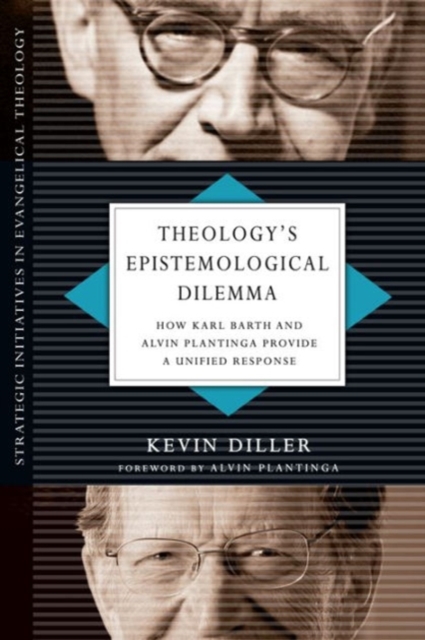Theology's Epistemological Dilemma: How Karl Barth and Alvin Plantinga Provide a Unified Response

Theology's Epistemological Dilemma: How Karl Barth and Alvin Plantinga Provide a Unified Response
The problem of faith and reason is as old as Christianity itself. Today's philosophical, scientific and historical challenges make the epistemic problem inescapable for believers. Can faith justify its claims? Does faith give us confidence in the truth? Is believing with certainty a virtue or a vice? In Theology's Epistemological Dilemma, Kevin Diller addresses this problem by drawing on two of the most significant responses in recent Christian thought: Karl Barth's theology of revelation and Alvin Plantinga's epistemology of Christian belief. This will strike many as unlikely, given the common stereotypes of both thinkers. Contrary to widespread misunderstanding, Diller offers a reading of both as complementary to each other: Barth provides what Plantinga lacks in theological depth, while Plantinga provides what Barth lacks in philosophical clarity. Diller presents a unified Barth/Plantinga proposal for theological epistemology capable of responding without anxiety to the questions that face believers today.
Karl Barth and Alvin Plantinga are not thought of as theological allies. Barth is famous for his opposition to philosophy's role in theology, while Plantinga is famous for his emphasis on warranted belief. Kevin Diller argues that they actually offer a unified response to the central epistemological dilemma in theology.
The problem of faith and reason is as old as Christianity itself. Today's philosophical, scientific and historical challenges make the epistemic problem inescapable for believers. Can faith justify its claims? Does faith give us confidence in the truth? Is believing with certainty a virtue or a vice?In Theology's Epistemological Dilemma, Kevin Diller addresses this problem by drawing on two of the most significant responses in recent Christian thought: Karl Barth's theology of revelation and Alvin Plantinga's epistemology of Christian belief. This will strike many as unlikely, given the common stereotypes of both thinkers. Contrary to widespread misunderstanding, Diller offers a reading of both as complementary to each other: Barth provides what Plantinga lacks in theological depth, while Plantinga provides what Barth lacks in philosophical clarity. Diller presents a unified Barth/Plantinga proposal for theological epistemology capable of responding without anxiety to the questions that face believers today.
PRP: 278.94 Lei
Acesta este Prețul Recomandat de Producător. Prețul de vânzare al produsului este afișat mai jos.
251.05Lei
251.05Lei
278.94 LeiIndisponibil
Descrierea produsului
The problem of faith and reason is as old as Christianity itself. Today's philosophical, scientific and historical challenges make the epistemic problem inescapable for believers. Can faith justify its claims? Does faith give us confidence in the truth? Is believing with certainty a virtue or a vice? In Theology's Epistemological Dilemma, Kevin Diller addresses this problem by drawing on two of the most significant responses in recent Christian thought: Karl Barth's theology of revelation and Alvin Plantinga's epistemology of Christian belief. This will strike many as unlikely, given the common stereotypes of both thinkers. Contrary to widespread misunderstanding, Diller offers a reading of both as complementary to each other: Barth provides what Plantinga lacks in theological depth, while Plantinga provides what Barth lacks in philosophical clarity. Diller presents a unified Barth/Plantinga proposal for theological epistemology capable of responding without anxiety to the questions that face believers today.
Karl Barth and Alvin Plantinga are not thought of as theological allies. Barth is famous for his opposition to philosophy's role in theology, while Plantinga is famous for his emphasis on warranted belief. Kevin Diller argues that they actually offer a unified response to the central epistemological dilemma in theology.
The problem of faith and reason is as old as Christianity itself. Today's philosophical, scientific and historical challenges make the epistemic problem inescapable for believers. Can faith justify its claims? Does faith give us confidence in the truth? Is believing with certainty a virtue or a vice?In Theology's Epistemological Dilemma, Kevin Diller addresses this problem by drawing on two of the most significant responses in recent Christian thought: Karl Barth's theology of revelation and Alvin Plantinga's epistemology of Christian belief. This will strike many as unlikely, given the common stereotypes of both thinkers. Contrary to widespread misunderstanding, Diller offers a reading of both as complementary to each other: Barth provides what Plantinga lacks in theological depth, while Plantinga provides what Barth lacks in philosophical clarity. Diller presents a unified Barth/Plantinga proposal for theological epistemology capable of responding without anxiety to the questions that face believers today.
Detaliile produsului









